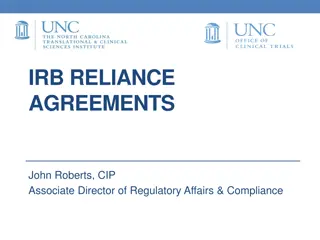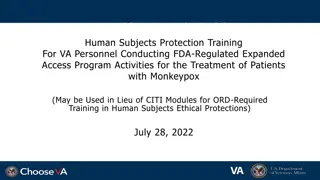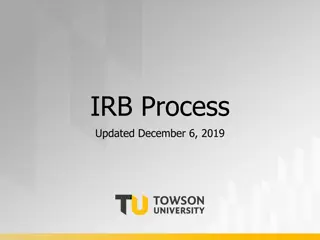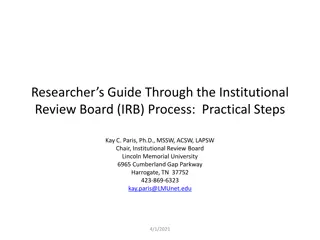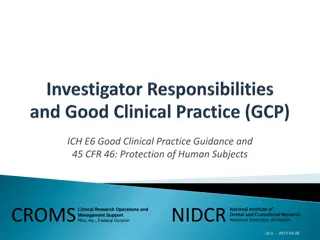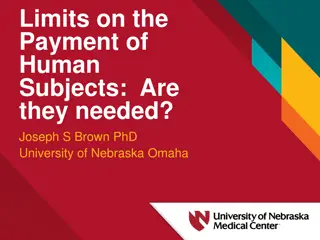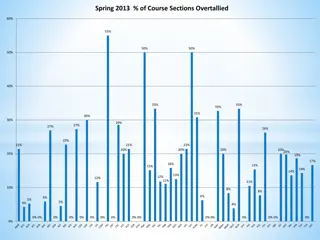Institutional Review Board
The Institutional Review Board (IRB) at AUCA plays a vital role in reviewing and approving research projects involving human subjects to ensure ethical standards are met. This includes obtaining informed consent, protecting privacy, and following international guidelines. Research must contribute to
0 views • 22 slides
Subject/Verb Agreement Practice Exercises
Practice identifying subjects and verbs, and correcting verb agreement errors in sentences. Examples include singular/plural subjects with corresponding verbs and compound subjects. Improve your understanding of subject-verb agreement through interactive exercises.
0 views • 5 slides
Key Components of Experimental Economics Methodology
Experimental economics methodology emphasizes the importance of clear objectives, controlled environments, honest instructions, and providing subjects with monetary incentives. The experimenter must have a clear objective in mind, ensure tasks are clearly stated for subjects, and analyze data accura
0 views • 12 slides
Understanding IRB Reliance Agreements in Research
IRB reliance agreements allow institutions to delegate IRB review responsibilities or collaborate with other institutions for human subjects research. Federalwide assurance (FWA) documents ensure compliance with regulations. Different types of agreements, such as IRB authorization agreements and ind
0 views • 23 slides
Guidance on Choosing Leaving Certificate Subjects for Academic and Career Success
Ensuring a good subject choice for the Leaving Certificate is crucial for future academic endeavors and career opportunities. Students should consider their strengths from Junior Cycle, choosing mandatory subjects like Irish, English, and Maths. Optional subjects offer a range of choices from French
1 views • 27 slides
Maximizing Student Potential with RPA and B Subjects
RPA and B subjects offer a versatile curriculum for all students, with similar assessments and the ability to cater to different learning styles. Running both subjects in the same class can optimize funding, reduce class sizes, and enhance student success rates. Factors influencing the choice betwee
1 views • 31 slides
Comprehensive Human Subjects Protection Training for VA Personnel
This training addresses the ethical principles and regulations governing VA research involving human subjects, focusing on conducting FDA-regulated Expanded Access Program activities for Monkeypox treatment. It covers historical events shaping research practices, key responsibilities of investigator
0 views • 25 slides
Education Performance Report August 2019
A detailed report on the performance of private candidates in various subjects for the CAPE exams and CCSLC exams in August 2019. The report includes pass percentage breakdowns for different subjects, overall performance comparisons with regional averages, and school-wise success rates. Notable achi
0 views • 26 slides
Understanding Institutional Review Board (IRB) Process
Institutional Review Board (IRB) plays a crucial role in ensuring research involving human subjects adheres to ethical standards. This summary provides insights into the IRB process, including determining the need for IRB review, defining human subjects research, and the importance of human subjects
0 views • 20 slides
Subjects in Focus: Philosophy, Psychology, Education, Sociology, and Library Science
Delve into the realms of knowledge through subjects like Philosophy, Psychology, Education, Sociology, and Library Science, each offering a unique perspective on understanding and dealing with the vast expanse of human knowledge. Philosophy explores truth through Logic, Psychology delves into the hu
0 views • 25 slides
Understanding Subject-Verb Agreement in Grammar
Subjects and verbs must agree in number to ensure grammatical accuracy. Singular subjects require singular verbs, while plural subjects demand plural verbs. Various rules and examples illustrate how prepositional phrases, word order, and questions can impact subject-verb agreement.
0 views • 28 slides
Understanding UGA's Human Research Protection Program
The UGA Human Research Protection Program (HRPP) aims to ensure the rights and welfare of research subjects by adhering to ethical and regulatory standards. This program consists of various components such as Institutional Leadership, Human Subjects Office, IRBs, Investigators, and more, with a miss
0 views • 9 slides
Subject Choices for AS and A Level Information Evening Highlights
Providing valuable insight for parents and pupils, the information evening covers topics such as parental influence on career decisions, advice on choosing A-level subjects, key dates to remember, and support available for pupils. It emphasizes the importance of GCSE results and introduces the Entit
1 views • 46 slides
Navigating the Institutional Review Board (IRB) Process: A Practical Guide
Understanding the IRB process is crucial for conducting ethical research involving human subjects. This guide outlines federal regulations, protective mechanisms, IRB goals, and the definition of human subjects in research. It also provides insights into the level of intervention, considerations whe
1 views • 26 slides
Understanding the Courts' Perspective on the Reid Technique
The Courts' view on the Reid Technique emphasizes following established guidelines, avoiding coercion, and treating subjects with respect. They caution against making promises or threats, denying rights, or conducting excessively long interrogations. The core principles include conducting interviews
0 views • 89 slides
Understanding Human Subjects Research at SDSU
Explore the process of conducting human subjects research at SDSU through lessons on recognizing research activities, determining involvement with human subjects, identifying common pitfalls in proposal submissions, finding IRB information, and submitting proposals. Gain insights on the importance o
0 views • 13 slides
Enhancing Human Subjects Research Through NIH Policy Changes
The National Institutes of Health (NIH) is implementing reforms and initiatives to improve the stewardship of research involving human subjects, particularly in the context of clinical trials. These changes include new forms for data collection, training in Good Clinical Practice, use of a single In
0 views • 13 slides
Junior Cycle Subject Choices and Career Pathways Overview
Explore the core, optional, and non-exam subjects offered in the Junior Cycle curriculum, including subjects such as Gaeilge, English, Mathematics, and more. Learn about the potential career pathways associated with subjects like French, Spanish, Business Studies, and Geography. Discover how these s
0 views • 20 slides
Clinical Research Guidelines and Regulations Overview
Clinical research encompasses various guidelines and regulations to ensure the protection of human subjects and the credibility of study results. Key aspects include Good Clinical Practice (GCP) standards, Title 45 of the Code of Federal Regulations (CFR) Part 46, and additional CFR sections for cli
0 views • 46 slides
Understanding Research Ethics and Human Subjects Involvement
Exploring the principles of research ethics involving human subjects, this content delves into responsible inquiry, ethical conduct, consent processes, fairness, and equity in research participation. It highlights the importance of respecting individuals, obtaining informed consent, and ensuring the
0 views • 14 slides
A Guide to Subject-Verb Agreement Basics
Understand the essentials of subject-verb agreement in sentences. Learn how singular subjects match singular verbs and plural subjects pair with plural verbs. Discover key rules, including handling words between the subject and verb, dealing with prepositional phrases, and recognizing subject placem
0 views • 7 slides
Welcoming Students to Tretherras: Key Dates, Subjects, and Pathways
Tretherras welcomes students with upcoming key dates, compulsory and optional subjects, including EBacc subjects that are highly valued by universities and employers. Students must choose between two pathways, each with core subjects and specific subject requirements. The guidance emphasizes the imp
0 views • 17 slides
Understanding Subject-Verb Agreement
Master the rules of subject-verb agreement for singular and plural subjects, irregular verbs like be, have, and do, and compound subjects. Learn how to match singular subjects with singular verbs and plural subjects with plural verbs, and understand verb forms for different scenarios. Explore exampl
0 views • 40 slides
Subject Selection Process at Cumberland High School
Explore the wide range of opportunities available at Cumberland High School for subject selection, including core subjects like English, Mathematics, Science, Geography, and History, as well as elective subjects across various disciplines. Learn about the elective subjects offered in areas such as H
0 views • 21 slides
Understanding Collective Bargaining in School Districts
Collective bargaining in school districts involves negotiating over mandatory and permissive subjects such as wages, hours, and conditions of employment. School districts must differentiate between mandatory and permissive subjects, and disputes over mandatory subjects must be resolved through impas
0 views • 29 slides
Exploring Transition Year: Benefits, Subjects, and Activities
Transition Year (TY) is a crucial phase in a student's academic journey, offering a myriad of benefits such as enhanced maturity, confidence, and emotional readiness for the real world. This transitional year allows students to delve into a diverse range of subjects, extracurricular activities, and
0 views • 15 slides
Proposed Rulemaking on Biospecimen Research: Federal Policy Update
The proposed rulemaking aims to enhance the protection of human subjects in research involving biospecimens. Key changes include expanding the definition of human subjects, requiring informed consent for biospecimen research, allowing broad consent for secondary research, and creating exemptions to
0 views • 17 slides
Understanding Compound Subjects in Grammar
Compound subjects joined by "and" usually require plural verbs, while compound subjects joined by "or," "nor," "either or," or "neither nor" may be singular or plural depending on the subject closest to the verb. Recognizing when to use singular or plural verbs with compound subjects is essential fo
0 views • 5 slides
Understanding Nouns, Subjects, and Direct Objects in Grammar
Nouns are versatile parts of speech that can function in various ways, including as subjects and direct objects in sentences. Subjects usually perform actions, while direct objects receive the action of the verb. This content explores the roles of nouns, subjects, and direct objects in sentences wit
0 views • 36 slides
Choosing Subjects Wisely for Junior Certificate Success
Students must carefully select subjects for their Leaving Certificate to shape their future career. Keeping options open by choosing a variety of subjects, focusing on personal strengths and interests, and avoiding influence from others is crucial. The new Junior Cycle emphasizes assessment through
0 views • 36 slides
Exploring Leaving Cert Subject Choices at Temple Carrig School
Discover the detailed schedule and core exam subjects of the Leaving Cert Subject Choice Evening at Temple Carrig School. Learn about the curriculum options, core and additional subjects, and the process to select subjects. Explore optional subjects like Computer Science and P.E. for Leaving Cert. G
0 views • 29 slides
Understanding IRB and IRBNet Processes at Lehman College
Explore the different types of IRB review processes, including exempt, expedited, and full/convened reviews. Learn about human subjects research, not human subjects research, and exempt categories. Discover the importance of obtaining informed consent and navigating IRBNet for research compliance at
0 views • 74 slides
Examining Payment Limits for Human Subjects Research
This article explores the necessity of setting limits on payment for human subjects in research. It delves into the role of Institutional Review Boards (IRBs) in protecting subjects and the balance between benefiting subjects and advancing research. It discusses how payments can increase participati
0 views • 26 slides
Evolution of Ethics in Human Subjects Research
Human Subjects Research (HSR) or Human Subjects Use (HSU) plays a vital role in medical research, with a historical background and strict ethical guidelines in place. From past atrocities to contemporary practices, the use of human subjects has evolved, emphasizing the importance of informed consent
0 views • 26 slides
Understanding the Options Process for Year 9 Students
This guide provides insights on the structured approach to Year 9 Options Evening, detailing changes in GCSEs, the new grading scale, core subjects, option subjects, choices available, and the specific GCSE option subjects students can select. Key information such as the shift from A*-G to 9-1 gradi
0 views • 17 slides
Probability Calculations with Venn Diagrams in School and City Settings
Explore probability calculations using Venn diagrams in scenarios involving student subjects (Geography and Biology) in a secondary school and newspaper readership in a city. Understand how to calculate probabilities related to studying specific subjects, studying none of the subjects, and reading s
0 views • 9 slides
Analysis of Course Sections Overfilled in Spring and Fall 2013
Analysis of the percentage of course sections overfilled in Spring and Fall 2013 shows a range of rates across various subjects. Spring 2013 had a higher percentage of overfilled course sections compared to Fall 2013. The comparison between Spring and Fall 2013 courses indicates notable disparities
0 views • 8 slides
Understanding Human Rights: Major Subjects and Prohibition of Torture
Explore the major subjects of human rights, spanning civil, economic, and new rights categories. Learn about the prohibition of torture as an absolute human rights principle upheld by various international conventions. Dive into the core principles and categories that underpin the realm of human rig
0 views • 39 slides
Guidelines and Procedures for Human Subjects Research at SUNY Oswego
Guidelines and procedures for conducting research with human subjects at SUNY Oswego are outlined by the Human Subjects Committee. The mission is to protect all subjects, especially students and vulnerable populations. Researchers must comply with regulations for the ethical conduct of studies invol
0 views • 15 slides
Understanding Subjects and Predicates in Sentences
Every complete sentence consists of a subject and a predicate. The subject is who or what the sentence is about, while the predicate tells something about the subject. By identifying subjects in sentences, you can gain a better understanding of sentence structure. Practice finding subjects in senten
0 views • 10 slides



